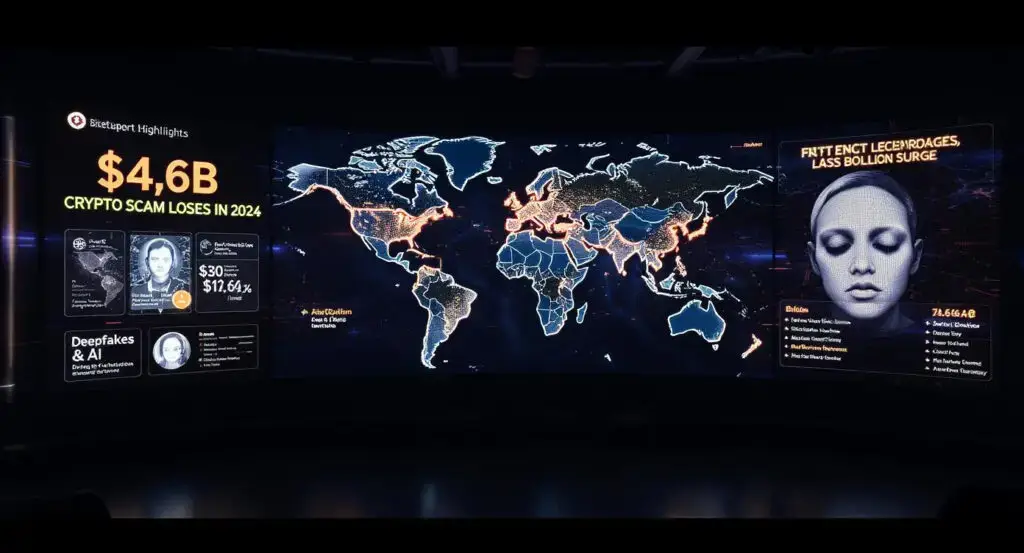In a stark warning to crypto users and the broader Web3 community, leading crypto exchange Bitget revealed that global scam losses will soar to $4.6 billion in 2024, fueled by increasingly sophisticated schemes involving deepfake technology and artificial intelligence.
The findings, detailed in Bitget’s newly released 2025 Anti-Scam Research Report, were published in collaboration with blockchain security firms SlowMist and Elliptic. The report marks the launch of Anti-Scam Month, Bitget’s June initiative aimed at raising security awareness and elevating industry-wide defense standards.
“The biggest threat to crypto today isn’t volatility it’s deception,” said Gracy Chen, CEO of Bitget. AI has made scams faster, cheaper, and harder to detect. At Bitget, we believe fighting back requires both technological rigor and ecosystem-wide collaboration.
Scammers Go High-Tech: Deepfakes, Fake Calls, and Trojan Job Offers
Bitget’s report paints a sobering picture of a threatened landscape transformed by emerging technologies. Scams have evolved well beyond traditional phishing emails, now leveraging synthetic media to manipulate victims through fake Zoom calls, AI-generated videos of public figures, and Trojan-laced job offers.
The exchange identifies three dominant categories driving the bulk of user losses:
Deep fake impersonations, social engineering schemes, and Ponzi-style projects disguised under DeFi or NFT branding. Each tactic preys not just on technical vulnerabilities but on human psychology, with scammers tailoring personalized attacks to maximize trust and deception.
Adding to the complexity, laundered funds are funneled through cross-chain bridges, obfuscation tools, and ultimately mixers or exchanges, making recovery efforts increasingly difficult for victims and investigators alike.
Fraud Rings Go Global, Using Telegram and X to Lure Victims
The report also highlights how Telegram and X (formerly Twitter) have become fertile hunting grounds for phishing schemes. Scammers often operate within comment sections and chat groups, impersonating official accounts or using bots to distribute malicious links.
Bitget and its partners analyzed case studies from major scams across Hong Kong and elsewhere, documenting how professional fraud rings are now running multi-layered, cross-border operations that blur the line between cybercrime and organized crime.
“Criminals are constantly evolving their methods of attack, using AI and finding new ways to scale their activities,” said Arda Akartuna, APAC lead crypto threat researcher at Elliptic. “This means that, reciprocally, we are also working to scale our technology and blockchain capabilities to track and identify the new methods criminals are using.”
Bitget’s $500M Protection Fund and New Anti-Scam Hub
To counter the surge in criminal activity, Bitget is rolling out a robust defense strategy. Its newly launched Anti-Scam Hub features real-time detection systems, scam pattern analysis, and user education tools.
The company also maintains a Protection Fund exceeding $500 million, designed to shield users from unforeseen losses and enhance platform trust. Meanwhile, SlowMist contributes advanced forensic tools capable of detecting complex scams, such as address poisoning, while Elliptic focuses on tracing the laundering trails of stolen assets across blockchain networks.
“This report reflects the real-world patterns we’re seeing on-chain every day,” said Lisa, security operations lead at SlowMist. “From phishing rings to fake staking apps, the tactics may change, but the psychology is always the same.”
Raising the Bar: Industry Collaboration Is Key
As scams continue to evolve, the report emphasizes that defeating them will require a united front. Bitget’s Anti-Scam Month seeks to mobilize not only users but the broader crypto industry, pushing for collective vigilance and education.
The report concludes with practical advice for individuals and institutions, including scam red flags and tips for navigating the DeFi, NFT, and Web3 space safely.
“Helping users trade smarter not just faster is our goal,” said Chen. “This is about building an ecosystem where trust, transparency, and security are the foundations for innovation.”
With losses reaching unprecedented levels and technology rapidly evolving, the message from Bitget’s report is clear: In crypto, awareness may be your most valuable asset.























